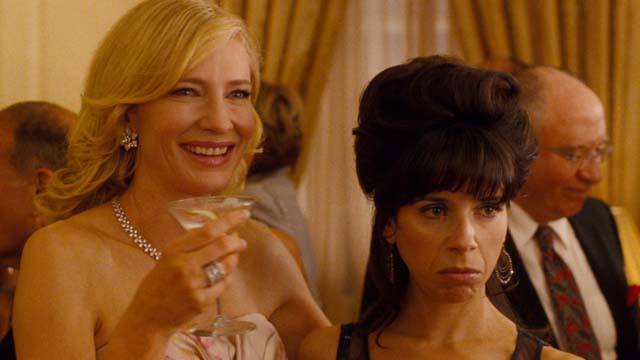By Armond White
Cate Blanchett’s singularly obnoxious character in Blue Jasmine blocks our empathy. First because she’s such a phony–having changed her name from the mundane Jeanette to the pretentious Jasmine (“My mother’s favorite flower”), next because she embodies superciliousness (comically indifferent to everyone’s interest besides her own love of couture-brands and high-living), then because writer director Woody Allen conceives her opportunistically as an effigy of Bernie Madoff privilege and thus a target ripe for sniping, and finally, due to the fussy, mannered, inelegant performance by the hopelessly inauthentic Blanchett herself.
 A companion piece to his similarly jazz-titled Sweet and Lowdown, Blue Jasmine (based on Rodgers & Hart’s “Blue Moon”) boasts Allen’s own egotism, presenting a protagonist who takes self-interest to pathological extremes. Jasmine is introduced as a fancy-dressed matron in the first-class section on a flight to San Francisco–a cruel comic routine of a solipsistic-babbler prompting Allen’s (and our own) contemptuous laughter. This attitude prevents the emotional recognition essential to contributing compassion and understanding to others; it’s the usual self-righteousness that makes Allen an insufferable social chronicler.
A companion piece to his similarly jazz-titled Sweet and Lowdown, Blue Jasmine (based on Rodgers & Hart’s “Blue Moon”) boasts Allen’s own egotism, presenting a protagonist who takes self-interest to pathological extremes. Jasmine is introduced as a fancy-dressed matron in the first-class section on a flight to San Francisco–a cruel comic routine of a solipsistic-babbler prompting Allen’s (and our own) contemptuous laughter. This attitude prevents the emotional recognition essential to contributing compassion and understanding to others; it’s the usual self-righteousness that makes Allen an insufferable social chronicler.
While ridiculing the same bourgeois type that celebrates him (a “critique” as unrealistic, unfelt and as flattering as a Friar’s Club roast), Allen can’t help exposing his own supecilliousness. Jasmine, the widowed, pill-popping, down-on-her-luck schizo, runs for help to her waif-like working-class sister, a grocery store clerk named Ginger—Oops! Apparently she also changed her name–from Giulietta? (signaling another of Allen’s Fellini rip-offs).
Ginger (played by Sally Hawkins) maintains a quick, sisterly smile despite Jasmine having ruined her marriage to a handyman (Andrew Dice Clay). Now a single-mother of two annoying, chubby boys, Ginger dates another grease-monkey Neanderthal, Chilly (Bobby Cannavale) who immediately distrusts/dislikes Jasmine. Rip-off Number 2: the close-quarters tension imitates A Streetcar Named Desire but with a crucial difference: Tennessee Williams’ reality-vs.-illusions sexual dynamic is archetypal. Allen’s couture-vs.-blue-collar dynamic is petty and sour. (Allen congratulates those New York culture-vultures who fell for Blanchett’s recent, laughable production of Streetcar at the Brooklyn Academy of Music.)
Blue Jasmine isn’t exactly timely (Allen’s jazz-score resembles one of Scorsese’s Rolling Stones scores where self-protective social reflection is reduced to personal obsession) yet, like the Reagan-era gentrification in Hannah and Her Sisters, this merely reflects today’s class insanity by pitting Jasmine’s enviable bourgeoisie against Ginger’s cartoonish working-class. By casting non-American actresses, Allen affects high-brow depth, yet distances these stock characters even further: Blanchett is artificial as always and the delightful Hawkins (star of Mike Leigh‘s masterful Happy-Go-Lucky) is automatically infectious, even though playing a fool susceptible to Jasmine’s snobbery. The scene of Hawkins’ subtle cellphone dejection is more moving than Blanchett’s Oscar-baiting hysterics. Blue Jasmine remains an undeniably anti-Mike Leigh view of class and psychology.
Chatterbox Jasmine keeps reliving her wounds; after bouts of electro-shock therapy, booze and Xanax, she constantly talks to herself like a maniac rehearsing Blanche DuBois’ monologues. Unlike Toni Collette’s powerful, deep-seated comic performance in P.J. Hogan’s Mental, Blanchett’s emotions are bathetic, entirely on the surface. Allen isn’t a good-enough director to make her anxieties felt like Kazan did in Streetcar, or Ophuls’ sympathy for the tragically flighty Madame De or Altman’s sensitivity to Shelly Duvall’s pretentious Millie in 3 Women–to name just a few of cinema‘s great, empathetic, tragediennes. Too bad Allen’s fake sentimentality prevents us from experiencing the downfall of a 21st century materialist in the humanity of a bimbo who was also a class commedienne. In Blue Jasmine, Allen’s relationship to the bourgeoisie is simple; he’s its court jester.
Follow Armond White on Twitter at 3xchair.
